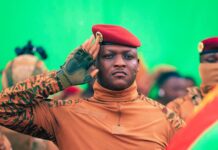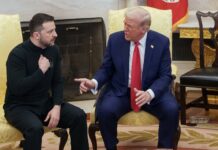As Russia has been increasingly isolated by much of the world due to sanctions put on the country following its invasion of Ukraine, Vladimir Putin has been looking towards the African continent for some allies. Unlike Western nations, which have largely been unequivocal in their condemnation of Russia’s invasion, most African nations have sought to take a more neutral stance with regard to the invasion.
Putin has seen this desire for neutrality by African governments as a potential opportunity for Russia to gain more of a foothold in the African continent, in order for him to fill some of the gaps that had previously existed before with Europe. Likewise, because of the abundance of natural resources present in the African continent, Russia sees the benefits in forming close relationships with African governments.
Following the start of the invasion of Ukraine, in an emergency session held by the United Nations 28 out of the 54 African countries (just over 51 percent) represented in the U.N. voted in favour of the resolution, condemning Russia for the invasion, according to the Brookings Institute. 17 African countries abstained and 8 did not vote at all.
In the United Nations vote, Putin did manage to find one ally among African nations willing to vote against the resolution in Eritrea. The totalitarian regime in power in Eritrea, was the only African country that voted against the resolution condemning Russia for its invasion. Joining alongside the likes of Belarus, Russia, North Korea, and Syria.
Despite around half of African nations voting in favour of condemning Putin’s invasion, most African governments have never wanted to show any kind of strong rebuke of Russia’s actions in favour of appearing as neutral parties in the manner. Despite their claims of “neutrality,” African nations have largely complied with much of the sanction put in place by Western nations (It’s not like they necessarily had a choice in the matter anyway).
One of the few African countries that seemed to break with this perception of neutrality was Morocco. At the request of the United States, Morocco has provided some military assistance towards Ukraine. The Moroccan government agreed to the transfer spare of parts for T-72 tanks to the Ukrainian military.
Likewise, in an attempt to show support for Ukraine, on the 16 of June 2023, a group of African leaders embarked on a so-called “peace-mission” to Ukraine. Zambia’s President Hakainde Hichilema, Senegal’s President Macky Sall, the President of the Comoros Azali Assoumani, South African President Cyril Ramaphosa and Egypt’s Prime Minister Mostafa Madbouly visited a site of a mass grave in the town of Bucha. However, the trip faced criticism for its lack of substance, particularly for its failure to condemn or express support for Ukraine in the face of Russian aggression.
Putin sees opportunities after military coups within Africa

One area Russia has found a lot of success in, as part of Putin aims of gaining greater influence in Africa, has been following a spate of military coups in Africa, particularly around the Sahel region. As a consequence of these military coups, there has been growing anti-France sentiment spreading around the region. As many of the nations experiencing this current political instability had formerly been French colonies, that had been seen as being part of France’s sphere of influence within Africa.
However, following these coups, the military juntas that have taken over have sought to undermine the influence France had over their nations and in France’s place Russia has sought to insert itself. Likewise, Russia has been accused of working in the background spreading propaganda, propagating these anti-France sentiments among West African populations and the broader Sahel region. Ukraine similarly has sought to build up better relations with African governments as the war has raged on. As part of this effort, according to the ISS, Ukraine is looking to build more embassies around Africa.
Ukraine has announced its intention to open embassies in Sudan, Tanzania, Mauritania, and Cameroon. That is an addition to its other embassies on the Africa continent in Algeria, Angola, Ethiopia, Egypt, Kenya, Libya, Morocco, Nigeria, South Africa, Senegal, and Tunisia. Similarly, the ISS reports how Ukraine will deliver food aid toward African nations. Especially towards war-torn Sudan, which is currently seeing a disastrous humanitarian crisis because of the war between the Rapid Support Forces and the Sudanese Army.
However, Ukraine will face an uphill battle, as Russian efforts (as well as other foreign powers) have at this stage formed years-long relationships with African regimes. As a result, their attempts at building up new relationships with African governments will take time.
Putin’s strategy seems to be working
At least in some cases, Putin’s strategy seems to have been working. Often following these military coups within African countries within the Sahel, demonstrators in favour of the coups have been seen waving Russian flags and holding banners featuring Putin’s face. Russian troops have been deployed in various African nations, such as Mali and more recently Niger as well. Typically, after Western troops from France or the United States, had been expelled by the military juntas that had overthrown their governments.
Due to Russia’s isolation on the world stage, it would continue to look to build relations wherever it can, therefore, Russia is likely going to continue looking to Africa for some allies. The political instability experienced by many nations, within Africa’s Sahel region especially, has provided Russia with a golden opportunity, which they are looking to take full advantage of.
The protracted conflict in Ukraine underscores a resurgence of Cold War-style tensions between Western powers and Russia. As both sides continue to vie for influence and control, this conflict has not only reshaped the geopolitical landscape but has also revived this historical rivalry which has had far-reaching implications.











